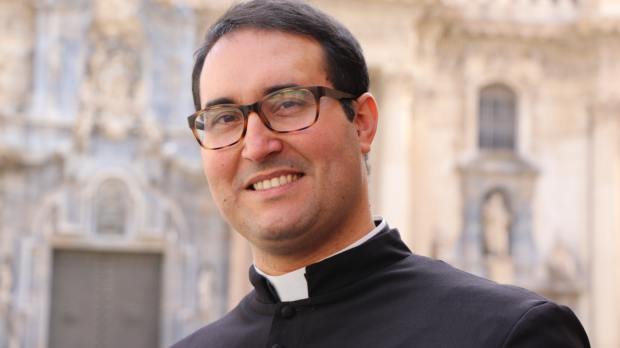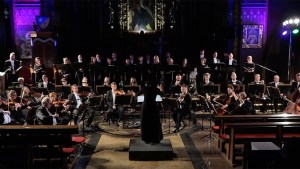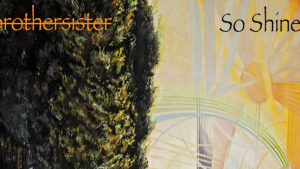Eduardo Pérez Orenes is a tenor. His life has always been closely linked to music, and that was precisely the way in which he found God: through music … and a book by G.K. Chesterton.
This past September 10, 2022, Eduardo was ordained at the parish church of Nuestra Señora de Cortes in Nonduermas (Murcia, Spain). It was the conclusion of a personal journey that this young man started through singing, not knowing that it would lead him to God.
“Toto corde meo quaero te.“
(I seek you with all my heart.)
– Psalm 119:10
Eduardo was born in a small town in Murcia (in southern Spain) called Ermita de Burgos. Just over 400 people live there. His family environment, like that of many in Spain, was not one of practicing the faith, although they did hold on to certain Christian customs.
“I didn’t grow up in a faith-filled family, but I was baptized,” he explains, “I made my First Communion; then I didn’t return to the Church until I was 23 years old,” he explains in an interview published by the Episcopal Delegation of Social Communication Media of the Diocese of Murcia.
Church was only for concerts
His interest in music awoke early in his life. He was so passionate about it that he began studying at the Massotti Music Conservatory of Murcia, and at one point was participating in up to 12 choirs at a time. He was passionate about singing, especially sacred music, early music, and Gregorian chant. As a result, he realized that he “didn’t go to church out of faith, but did go to give concerts.”
God had prepared that path, so that Eduardo would experience a thirst for eternity. “The most beautiful things we sang were magnified when they were in context,” he explains. In this way, what Pope Benedict XVI has so often said came true for him:
Music is capable of opening minds and hearts to the dimension of the spirit and leads people to lift their gaze to the Most High, to open themselves to the absolute Good and Beauty whose ultimate source is in God.
– Pope Benedict XVI, Address, April 29, 2010
Liturgical celebrations seemed to him “a splendid thing,” and when he performed in them, even though he wasn’t a practicing Catholic, he remembers that he wished that his singing would become a sincere expression of the words he sang, that all the beauty of the texts would come alive in him. “It was a longing that I felt, but, evidently, faith is a gift,” he says.
Only concerned with success
Over the years, his love of music led to a professional career and the life of an artist. Eduardo then chose — as he himself points out — excitement, extravagance, and triumphs as the goal of his life. He admits that at that stage he appreciated art, beauty, and music, but he was only looking out for himself:
I was always aiming for something more and, when your heart becomes so ambitious, everything and everyone becomes a tool to help you keep achieving more than you already have. Everything had to revolve around me and my successful career, prestige and fame. I didn’t love anyone anymore and I wasn’t able to see that this lifestyle could result in my being alone.
At that vital moment, something happened to Eduardo that he is now deeply grateful for: “Some good friends saved me from my selfishness.”
Far away and close at the same time
One day, he explains, someone sent him a book by G.K. Chesterton, a Catholic journalist and writer who had converted to Catholicism. It was Orthodoxy. The pages of that book overturned his plans. They gave him the light to discover that he was going to find happiness in what was very close to him, music, but only because music was linked to God. The One who is Infinite and Inexhaustible Love had been waiting for him while he walked so near and yet so far from Him.
Eduardo explains what he felt then: “When one goes away, one needs then to return to one’s roots. It was a shock for me to realize that this way of living in love and the best of humanity had been given to me by the Church, like a mother who gives the best to her children.”
He saw clearly that he had to return to God, go to confession, and return to catechesis to learn more about the faith and practice it. He wanted to receive confirmation. Singing became even more wonderful now that he truly identified with what he was singing, but it took a back seat: God was calling him to deepen his prayer life and to do apostolate to bring other people closer to the faith, especially those who had not had the opportunity to know the immense love of God and the Church.
Thus came the moment when God called him to something higher.
“Until then, no one around me had spoken to me about God, and I was thirsty to discover more,” he says. That’s how he began to consider his vocation to the priesthood.
Giving his life for others
Eduardo was finishing his degree in singing when he decided to enter the seminary. He wanted to put his ideas in order, but from the very first moment it was clear to him: “I saw that this was the best place to put the gifts God had given me at the service of others, as a priest.”
In addition to meeting young people in the seminary who shared his concerns and aspirations, the formation has helped him to discover and cultivate his desire to love others in daily acts of love and service, and he has felt the importance of being close to others in their problems.
Eduardo has now been ordained a priest in aeternum (it’s a sacrament that leaves a mark that will never be erased) at the parish of El Salvador de Caravaca de la Cruz. From now on he wants to follow the Lord, adopting a motto that is a verse from the Gospel of St. John: “No one has greater love than this, to lay down one’s life for one’s friends.” (Jn 15:13). This choice – as he himself explains – is due to the fact that since he entered the seminary, he has felt a call to offer his life for all those around him who do not believe, for all those who have not yet discovered the faith.



